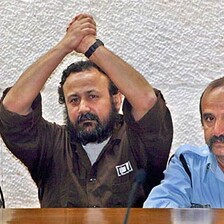The Electronic Intifada 28 February 2008

Blow to Abbas: Israeli cabinet member Benjamin Ben-Eliezer recently called for the release of Palestinian political prisoner, Marwan Barghouthi “in order to obtain results in the peace process.” (Luay Sababa/MaanImages)
At Annapolis, just like on so many occasions before, it was proclaimed that a “window of opportunity” had opened. Since the meeting, Israel’s military attacks have killed more than 210 Palestinians in the occupied territories and Israel has escalated the construction of new settlements, increased the number of roadblocks and tightened its siege of Gaza.
But for Israeli leaders it is always the Palestinians who are to blame for missing any “opportunities.” And probably that is why there are prominent voices from Israel calling for changing the Palestinian negotiating partner, Mahmoud Abbas. Although he has been so far the uncontested Palestinian leader who earned unreserved “international community” support for his commitment to peace as well as his courage and clarity of vision, he seems not be the one who could offer “results,” according to Israeli cabinet minister Benjamin Ben-Eliezer.
Ben-Eliezer called last Saturday for the release of jailed Palestinian leader Marwan Barghouthi in a bid to push the stalled peace process forward. “Barghouti must be set free in order to obtain results in the peace process,” Ben-Eliezer said. “I have a lot of respect for Mahmoud Abbas and for Salam Fayyad, but if we want results we must address Barghouti.” Ben-Eliezer insisted that the Fatah leader and backbone of the intifada was capable of persuading the Palestinian people to accept a peace settlement with Israel.
Barghouti is a highly-respected freedom fighter among Palestinians, currently serving five life sentences in Israel after a trial in an occupier’s court whose legitimacy Barghouti did not recognize. Ben-Eliezer’s call for Barghouti’s release is not the first to come from a prominent Israeli, but it must nevertheless come as a severe blow to Abbas. To call for Barghouti’s release as, say, a gesture to the Palestinians, or in exchange for an Israeli prisoner of war held by the Palestinian resistance in Gaza, is one thing. But to view him as an alternative partner for a redundant Abbas is something else altogether.
For Abbas it means that all he invested in the peace process — including his highly unpopular policies meant to appease Israel, Washington and the “international community,” all at the expense of his popularity and even legitimacy among his own people — is being thrown back at him with total ingratitude. Israel could not have invented a Palestinian leader more compliant than Abbas, and yet even Abbas is not good enough for Israel.
Abbas is now threatened with the same treatment his predecessor Yasser Arafat received. Arafat, once embraced by Israel as a “partner” was abandoned, demonized and finally, many Palestinians believe, murdered after he had stripped himself of every political card he could have used to protect his people’s rights in negotiations. This was the price Arafat paid to gain acceptance by Israel and its backers, but no matter how much he appeased them it was not enough.
There is nothing new in this Israeli pattern: it has always tried to foster “alternative” Palestinian leaderships who would make peace not by insisting on fundamental rights, but through surrender and agreeing to serve as Israeli subcontractors. What is shocking is the folly of Palestinian leaders who claimed that they had learned the “lessons” of the past but who once again have gone chasing after a mirage and a fake promise of peace, squandering on the way valuable time and most importantly rights while Israel has continued to gobble up the land.
It is obvious that Ben-Eliezer’s call will not be heeded. No matter what they tell their supporters, no Israeli leader could really be so naive as to believe that it was Abbas or his appointed but US-backed prime minister Salam Fayyad who stand alone in the way of peace, or that Barghouti would agree to surrender conditions that even these tailor-made “leaders” cannot accept. Yes, Abbas and Fayyad are weak primarily because they are dependent on Israel and Washington, and their weakness has never been the result of their failure to convince the Palestinian people to accept a peaceful settlement; on the contrary, they were totally unable to convince Israel to abide by any of the terms of the many accords and initiatives that they kept pinning their hopes on.
Even if Barghouti were released — and it is to be demanded that he along with all the political prisoners held by Israel be promptly released — and he were then to assume the leadership, he would not likely be as conciliatory and supplicant as the Israeli-recognized Palestinian leaders.
Test balloons such as this one cannot be serious. Obviously they serve more than one purpose for Israel. They create the impression that the responsibility for lack of progress lies on the Palestinian shoulders, while “innocent” Israel is willing to release a “convicted terrorist with Jewish blood on his hands” for the sake of peace. This notion can also buy Israel a lot of time. But most importantly it is probably meant to dispel any thinking that Hamas is the only alternative to a discredited Abbas.
With this lopsided logic the region continues to drift further from the right track of common sense, realism and peace.
Hasan Abu Nimah is the former permanent representative of Jordan at the United Nations. This article first appeared in The Jordan Times and is reprinted with the author’s permission.




